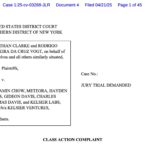The week has kicked off with notable shifts in the financial landscape, as the U.S. dollar plummets to three-year lows amid declining performances on Wall Street. In a surprising twist, Bitcoin, a cryptocurrency often influenced by stock market trends, appears to be holding its ground. This resilience hints at a potential migration from traditional fiat currencies like the USD towards assets perceived as safer, including Bitcoin and stablecoins. The landscape could further shift if reported actions materialize from President Donald Trump regarding Federal Reserve Chairman Jerome Powell, which might destabilize the dollar and U.S. stock exchanges even further.
Historically, Turkey’s financial struggles offer a pivotal lesson in this regard. The Turkish lira has faced severe depreciation over recent years, largely attributed to President Recep Tayyip Erdogan’s interventions in the central bank’s policies. Since Erdogan began altering the central bank’s direction in 2019, the lira has seen a staggering decline, moving from around 5.3 to 38 per dollar. This situation has prompted a significant transfer of capital towards Bitcoin and stablecoins since 2020 as Turkish investors seek refuge from their plummeting currency.
“We certainly don’t believe in high interest rates. We will pull down inflation and exchange rates with low-rate policy … High rates make the rich richer, the poor poorer. We won’t let that happen,” Erdogan said in 2021.
Trump’s increasingly vocal disagreements with the Federal Reserve echo Erdogan’s path, focusing on the need for lower borrowing costs despite warnings of stagflation. The dynamic between Trump and Powell has reached an intense level, with Trump recently labeling Powell a “major loser.” Such rhetoric may signal implications for the dollar’s strength, affecting investor sentiment and possibly instigating a shift towards cryptocurrencies as alternatives.
As the economic narrative unfolds, marked by potential disruptions in traditional monetary policies, American investors may find themselves looking for safe havens in alternatives like Bitcoin—much like their Turkish counterparts did. While it remains uncertain whether the U.S. dollar will face a collapse similar to the lira, the implications for global markets could be substantial, given the dollar’s role as a global reserve currency and the foundational status of the U.S. Treasury market in international finance.

Impact of Economic Turbulence on Investments
The current economic landscape highlighted by the U.S. dollar’s decline and Wall Street’s losses is essential for understanding potential shifts in financial behavior. Below are key points related to this situation:
- U.S. Dollar Weakness:
- USD has dropped to three-year lows, indicating potential instability.
- Weakness in the dollar may drive investors to seek alternatives like bitcoin (BTC).
- Bitcoin’s Resilience:
- Contrary to traditional assets, bitcoin remains strong amidst market turmoil.
- This could signal a larger trend toward decentralized, censorship-resistant assets.
- Political Influence on Economic Policy:
- Trump’s threats to fire Federal Reserve Chairman Jerome Powell could exacerbate dollar volatility.
- Ongoing criticisms of the Fed highlight tensions between political leadership and monetary policy.
- Lessons from Turkey:
- The inflation-fueled collapse of the Turkish lira provides a cautionary tale regarding central bank interference.
- Turkey’s experience indicates that undermining central bank independence can lead to significant currency depreciation and loss of investor confidence.
- Potential Impact on U.S. Investors:
- Should U.S. financial policies mirror Turkey’s, investors may look to diversify into BTC and stablecoins.
- This shift could lead to greater instability in traditional markets, affecting savings, investments, and economic growth.
“If better sense fails to prevail, U.S. investors may feel incentivized to move away from U.S. assets and into BTC and other alternative investments, just as Turks did.”
Bitcoin Stands Strong Amid U.S. Dollar Decline: Insights from Historical Lessons
This week has been marked by a notable decline in the U.S. dollar, plummeting to three-year lows, while the traditional equity markets have also taken significant hits. Interestingly, amidst this chaos, bitcoin has shown resilience, defying typical trends that often see it mirroring Wall Street movements. As speculations rise about potential shifts in Federal Reserve leadership, particularly with reports of Donald Trump’s desire to replace Chairman Jerome Powell, the crypto realm could be poised for a surge, particularly in seizure and censorship-resistant assets such as bitcoin and stablecoins.
Competitive Advantages and Market Responses
The current environment could lead to an increase in investor interest in cryptocurrencies, drawing parallels to historical scenarios like those in Turkey. Investors might find the prospect of bitcoin and stablecoins more appealing as they look for alternatives to traditional currencies plagued by instability. Bitcoin has a unique advantage in this scenario: it operates independently of government controls, providing a safe haven for those looking to safeguard their investments from potential devaluation.
Conversely, the U.S. dollar’s position as a global reserve currency means that any significant decline could have far-reaching implications. While U.S. investors may begin to pivot towards assets like BTC, global markets that depend on the dollar could experience heightened volatility. The uncertainty could fuel a hesitancy among foreign investors towards U.S. assets, particularly if they fear a scenario similar to Turkey’s economic troubles.
Beneficiaries and Potential Challenges
The beneficiaries of this tumultuous financial climate could predominantly include cryptocurrency enthusiasts and investors who have long championed assets like bitcoin as a hedge against fiat erraticism. Retail investors seeking refuge from a faltering dollar may flock to digital currencies, fostering broader adoption and increasing market liquidity. Additionally, cryptocurrency exchanges and blockchain technology firms might see an uptick in users and transactions as traditional avenues face more scrutiny.
On the flip side, established financial institutions may face challenges as investors look to alternative currencies. Moreover, dollar-dependent economies could find themselves exacerbated by the swift capital flight, which may further destabilize their financial systems. If the dollar’s decline continues or accelerates, it could create an inflexible cycle of distrust in traditional banking systems, driving more capital into decentralized finance (DeFi) solutions.
As we navigate these rapidly shifting economic landscapes, it becomes increasingly evident that decisions made by influential figures, such as Trump’s actions regarding the Federal Reserve, could have profound implications not only for the U.S. economy but also for international financial stability. The lessons learned from Turkey could serve as a pivotal reference point for those scrutinizing the intertwining fates of fiat currencies and the burgeoning crypto market.

















